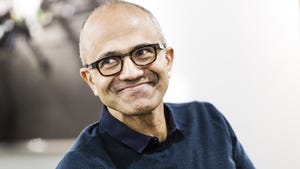Monetization still a challenge for telcos, but BT sees 'light at the end of the tunnel'
During FutureNet World conference in London, European telco representatives agreed challenges remain when it comes to monetizing their networks, but some seemed cautiously optimistic about the sector's future.

During a keynote panel on day one of the FutureNet conference in London, executives at some of the UK's and Europe's biggest networks agreed that monetization continues to be a struggle.
Vodafone Chief Network Officer Andrea Dona noted that, at the moment, the telcos' challenge is to "unburden themselves" from their legacy in order to move on to newer technologies, namely fiber-to-the-premises (FTTP) and 5G.
In the current investment environment, Dona argued, this creates a conflict between investing in new technologies and replacing the old. "It's a constant battle between spending money – because you have to spend money to address the legacy – and at the same time keep ahead of the game in terms of the new capability."
"I would love to have a lot more money to be able to address the legacy a lot quicker. So that I can unburden myself and then drive the new capability," he added.
His remarks, of course, come as Vodafone and Three are making the case that they should be allowed to merge in order to have more money. The companies have argued that merging their operations will allow them to invest more in the network.
BT Group CTO Howard Watson, meanwhile, noted that the industry is moving from an ecosystem where users connect to the network to communicate with each other and get small pieces of information, to a world where they expect continuous and seamless connectivity. However, he added: "it's brilliant that we as a telco enjoy effectively an annuity spring through subscriptions from our customers, but at £10 to £15 a month, that ain't enough for the world I've just described," pointing to an opinion piece published this week in The Telegraph arguing that point.
Laurent Leboucher, the group CTO at Orange, admitted that monetization has proven to be a tough task for telcos. He said Orange's approach has been to create platforms for different business segments in the B2B arena, while also working on making network APIs available to developers.
6G in Brisbane, not Los Angeles
He noted that focusing on use cases rather than technologies themselves is crucial when it comes to monetization, but admitted it remains a challenge.
Watson, meanwhile, argued that even though telcos are currently "in the roaring 20s of investing," the industry goes through cycles with periods of heavy investment followed by monetization. He noted that, given a growing emphasis on immediate returns, it has become harder to find investors who accept that there will be periods when return on invested capital (ROIC) will be higher than weighted average cost of capital (WACC).
At the same time, he remains optimistic about the second half of the decade, saying there is light at the end of the tunnel. He added that BT has now managed to remove the access bottleneck through FTTP and 5G rollout. It has also built a converged cloud native core capability on an all-IP core network, simplifying its infrastructure to a point where it can launch new services faster than before.
He was particularly optimistic about investments in fiber, saying it is in place for the next 50 years, not just until the next G comes along.
When it comes to the Gs, meanwhile, he said the industry has to show discipline around adopting 6G in order to allow more time to monetize current investments. He said telcos should aim for 2032, not 2028, or "Brisbane rather than Los Angeles," in Olympics terms.
Read more about:
EuropeAbout the Author(s)
You May Also Like












